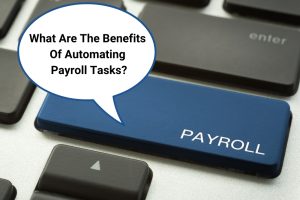What Are The Benefits Of Automating Payroll Tasks?

In today’s fast-paced business world, finding ways to streamline and improve processes is crucial for staying competitive. One such area ripe for innovation is payroll management. Automating payroll tasks can bring numerous benefits, enhancing efficiency, accuracy, and productivity. Let’s explore these benefits in detail.
What is payroll automation?
Payroll automation uses technology to manage and process payroll tasks without extensive manual intervention. Instead of handling payroll manually, businesses can utilise software that automates calculations, tax filings, direct deposits, and other related tasks. This saves time and reduces the likelihood of human error, ensuring that employees are paid accurately and on time.
How does automating payroll improve efficiency?
Automating payroll improves efficiency by streamlining various payroll-related tasks. Traditional payroll processes can be time-consuming, involving multiple steps like calculating hours, deducting taxes, and processing payments. With automation, these tasks are handled swiftly and accurately. This frees up valuable time for your HR team, allowing them to focus on more strategic activities that contribute to business growth.
Moreover, automation reduces the risk of errors common with manual payroll processing. Payroll mistakes can lead to significant issues, including dissatisfied employees and potential legal troubles.
What are the cost savings of automating payroll?
One of the most compelling benefits of automating payroll is the potential for cost savings. Manual payroll processing often requires considerable resources, including time and personnel. By automating these tasks, you can reduce the need for additional staff or overtime hours spent on payroll management.
Automation also helps avoid costly errors. Payroll mistakes can result in fines, penalties, and additional administrative costs. By reducing the likelihood of mistakes, automation helps reduce these unnecessary expenses. Furthermore, the efficiency gained from automation can lead to indirect cost savings by boosting overall productivity and allowing your team to focus on more revenue-generating activities.
How does payroll automation enhance accuracy?

Accuracy is paramount in payroll processing. Even minor errors can lead to significant problems, including legal issues and employee dissatisfaction. Automating payroll ensures that calculations are precise and consistent, reducing the risk of errors. Automated systems are designed to handle complex calculations, tax deductions, and compliance requirements, ensuring that everything is accurate and up-to-date. Additionally, payroll automation tracks all changes in tax laws and regulations, automatically updating the system to comply with the latest standards.
What security benefits does payroll automation offer?
Security is a primary concern when handling sensitive employee information. Manual payroll processes often involve physical documents and multiple touchpoints, increasing the risk of data breaches and fraud. Payroll automation provides a secure environment for managing payroll data, with advanced encryption and access controls to protect sensitive information.
Automated and comprehensive payroll services also offer secure data storage, reducing the risk of data loss due to physical damage or human error. By centralising payroll data in a safe digital environment, you can ensure that your employees’ information is well-protected and easily retrievable when needed.
How does automating payroll support scalability?
As your business grows, your payroll needs become more complex. Handling a growing workforce with manual payroll processes can be challenging and time-consuming. Payroll automation supports scalability by quickly adapting to your changing needs. Whether adding new employees, expanding to new locations, or dealing with more complex payroll structures, automated systems can handle these changes seamlessly.
Automated payroll solutions are designed to scale your business, ensuring that your payroll process remains efficient and accurate, regardless of how much your company grows. This scalability allows you to focus on growth without worrying about the increasing complexities of payroll management.
What are the benefits for employee satisfaction?
Happy employees are essential for a successful business. One way to enhance employee satisfaction is by ensuring that payroll is handled accurately and on time. Payroll automation ensures that employees receive their payments promptly, reducing the risk of errors and delays that can cause frustration and dissatisfaction.
Automated payroll systems also provide employees with greater transparency and accessibility. Employees can easily access their payroll information through self-service portals, including pay slips, tax deductions, and leave balances.
How can automating payroll improve reporting and analytics?

Effective decision-making requires accurate and timely data. Automating payroll provides real-time insights into various aspects of your payroll process. Automated systems generate detailed reports and analytics, allowing you to monitor payroll expenses, track trends, and identify areas for improvement.
These insights are invaluable for making informed decisions and optimising your payroll process. Whether you need to analyse labour costs, assess compliance risks, or plan for future growth, automated payroll systems provide the data you need to make strategic decisions.
What is the impact of payroll automation on compliance?
Compliance with tax laws and regulations is a critical aspect of payroll management. Non-compliance can result in significant fines and legal issues. Payroll automation ensures that your payroll process complies with the latest laws and regulations. Automated systems are regularly updated to reflect changes in tax codes and compliance requirements, reducing the risk of non-compliance.
Additionally, automated payroll systems simplify the audit process. With detailed records and accurate data, you can quickly provide the necessary documentation and reports during audits, ensuring a smooth and hassle-free audit experience.
How does payroll automation integrate with other systems?
Modern businesses rely on various software systems to manage different aspects of operations. A payroll system is designed to integrate seamlessly with other HR and accounting software, creating a cohesive and efficient workflow.
Integrating payroll automation with other systems allows you to streamline operations and improve efficiency. Data from time-tracking systems, employee management software, and accounting tools can be easily transferred to the payroll system, ensuring that all information is accurate and up-to-date.
Ready to automate your payroll?
Incorporating payroll automation into your business can bring numerous benefits, from improved efficiency and accuracy to enhanced security and employee satisfaction. By reducing the time and resources spent on manual payroll tasks, you can focus on growing your business and achieving your strategic goals.
If you’re ready to experience the benefits of automating payroll, you can learn more at Up2Date Administration. Our expert team can provide the tools and support you need to streamline your payroll process and ensure accuracy and compliance.
